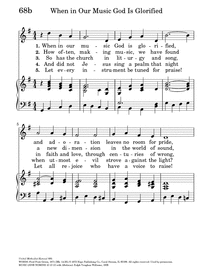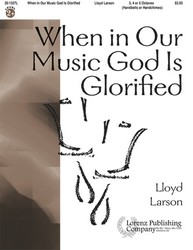- |
User Links
When in Our Music God Is Glorified

When in our music God is glorified
Author: Fred Pratt Green (1971)Tune: ENGELBERG
Closing Songs
ONE LICENSE: 00445; 199868
Published in 86 hymnals
Printable scores: MusicXMLAudio files: MIDI, Recording
Representative Text
Author: Fred Pratt Green
 The name of the Rev. F. Pratt Green is one of the best-known of the contemporary school of hymnwriters in the British Isles. His name and writings appear in practically every new hymnal and "hymn supplement" wherever English is spoken and sung. And now they are appearing in American hymnals, poetry magazines, and anthologies.
Mr. Green was born in Liverpool, England, in 1903. Ordained in the British Methodist ministry, he has been pastor and district superintendent in Brighton and York, and now served in Norwich. There he continued to write new hymns "that fill the gap between the hymns of the first part of this century and the 'far-out' compositions that have crowded into some churches in the last decade or more."
--Seven New Hymns o… Go to person page >
The name of the Rev. F. Pratt Green is one of the best-known of the contemporary school of hymnwriters in the British Isles. His name and writings appear in practically every new hymnal and "hymn supplement" wherever English is spoken and sung. And now they are appearing in American hymnals, poetry magazines, and anthologies.
Mr. Green was born in Liverpool, England, in 1903. Ordained in the British Methodist ministry, he has been pastor and district superintendent in Brighton and York, and now served in Norwich. There he continued to write new hymns "that fill the gap between the hymns of the first part of this century and the 'far-out' compositions that have crowded into some churches in the last decade or more."
--Seven New Hymns o… Go to person page >Text Information
Related Texts
| First Line: | When in our music God is glorified |
| Title: | When in Our Music God Is Glorified |
| Author: | Fred Pratt Green (1971) |
| Meter: | 10.10.10.4 |
| Place of Origin: | England |
| Language: | English |
| Copyright: | © 1972, Hope Publishing Co. |
| Liturgical Use: | Closing Songs |
- Year A, Ordinary Time, Proper 5 (10)
- Year B, Easter season, Fifth Sunday
This is recommended for Year B, Easter season, Fifth Sunday by 2 hymnal lectionary indexes including Glory to God: the Presbyterian Hymnal #641. - Year B, Easter season, Fifth Sunday
- Year B, Ordinary Time, Proper 5 (10)
- Year B, Ordinary Time, Proper 6 (11)
This is recommended for Year B, Ordinary Time, Proper 6 (11) by 2 hymnal lectionary indexes including Glory to God: the Presbyterian Hymnal #641. - Year B, Ordinary Time, Proper 15 (20)
- Year C, Christmas season, Holy Name of Jesus (Mary, Mother of God)
- Year C, Epiphany Season, Ninth Sunday
English
- African American Heritage Hymnal #112
- Ancient and Modern: hymns and songs for refreshing worship #821
- Baptist Hymnal 1991 #435
- Catholic Book of Worship III #509
- Celebrating Grace Hymnal #309
- Chalice Hymnal #7
- Christian Worship (1993): a Lutheran hymnal #248
- Christian Worship (2008): supplement #734
- Christian Worship: Hymnal #628
- Church Hymnary (4th ed.) #203a 10 shown out of 70
Korean
Spanish
Scripture References:
st. 3 = 1 Chron. 16:42
st. 4 = Matt. 26:30, Mark 14:26
st. 5 = Ps. 150, Eph.5:19-20, Col.3:16
At the request of John W. Wilson (PHH 278), Fred Pratt Green (PHH 455) wrote this text in Norwich, England, in 1971. It was intended for use with Charles V. Stanford's ENGELBERG at a London conference of the Methodist Church Music Society. Originally entitled "When in Man's Music God Is Glorified," the text was first published in Pratt Green's 26 Hymns (1971). This hymn has been widely accepted in many recent hymnals and is sung in numerous choral festivals.
“When in Our Music” is the only hymn text in Christendom that explains the reasons for church music while simultaneously offering "alleluias" to God. The various stanzas deal with our humility in performance (st. 1), the aesthetics of musical worship (s1. 2), and the history of church music (st. 3). The final two stanzas present a biblical model (st. 4) and quote Psalm 150 (st. 5). (A fruitful study could be made of this text and the Christian Reformed Church "Statement of Principle on Church Music" and its implications and practice, Psalter Hymnal, pp. 11-15.)
Liturgical Use:
Regular worship services, but most often at special praise services, choral liturgies, worship conferences, and other "musical feasts"; appropriate for recognizing the work of church musicians.
--Psalter Hymnal Handbook
Notes
Scripture References:
st. 3 = 1 Chron. 16:42
st. 4 = Matt. 26:30, Mark 14:26
st. 5 = Ps. 150, Eph.5:19-20, Col.3:16
At the request of John W. Wilson (PHH 278), Fred Pratt Green (PHH 455) wrote this text in Norwich, England, in 1971. It was intended for use with Charles V. Stanford's ENGELBERG at a London conference of the Methodist Church Music Society. Originally entitled "When in Man's Music God Is Glorified," the text was first published in Pratt Green's 26 Hymns (1971). This hymn has been widely accepted in many recent hymnals and is sung in numerous choral festivals.
“When in Our Music” is the only hymn text in Christendom that explains the reasons for church music while simultaneously offering "alleluias" to God. The various stanzas deal with our humility in performance (st. 1), the aesthetics of musical worship (s1. 2), and the history of church music (st. 3). The final two stanzas present a biblical model (st. 4) and quote Psalm 150 (st. 5). (A fruitful study could be made of this text and the Christian Reformed Church "Statement of Principle on Church Music" and its implications and practice, Psalter Hymnal, pp. 11-15.)
Liturgical Use:
Regular worship services, but most often at special praise services, choral liturgies, worship conferences, and other "musical feasts"; appropriate for recognizing the work of church musicians.
--Psalter Hymnal Handbook
Access an additional article on the Canterbury Dictionary of Hymnology:
Tune
ENGELBERGCharles V. Stanford (b. Dublin, Ireland, 1852; d. Marylebone, London, England, 1924) composed ENGELBERG as a setting for William W. How's "For All the Saints" (505). The tune was published in the 1904 edition of Hymns Ancient and Modern with no less than six different musical settings. It is clearly…
For Leaders
Text:
The lyrics for “When in Our Music God is Glorified” were authored by Fred Pratt Green in 1971. Pratt, a British Methodist minister, wrote some plays and hymns during his time on ministerial circuits, but did not begin writing extensively until his retirement in 1969. This hymn is from his prolific retirement period. Although this hymn is a recent addition to church hymnals, it has quickly become a popular congregational song.
Tune:
The tune for “When in Our Music God is Glorified” is titled: ENGELBERG. It was composed in 1904 by Charles V. Stanford, an Irish composer and conductor. The tune was originally written for William H. How’s “For All the Saints,” but is now primarily used for “When in Our Music God is Glorified.” When Stanford first published the tune, he included six additional musical settings.
When/Why/How:
It serves well as a congregational hymn or doxology, but it could also be used special praise services
Suggested music for this hymn:
- For the Organ: “When in Our Music God is Glorified”
- For Handbells: “When in Our Music God is Glorified”
- For Woodwinds: “When, in Our Music, God is Glorified”
Luke Getz Hymnary.org
Timeline
Arrangements
Media
Psalter Hymnal (Gray) #512
- Full Score (Made with Sibelius) (XML)
- Audio recording from Evangelical Lutheran Worship #851
- Audio recording from Glory to God: the Presbyterian Hymnal #641
- MIDI file from Psalter Hymnal (Gray) #512
- MIDI file from Psalter Hymnal (Gray) #512
- Audio recording from The United Methodist Hymnal #68
- MIDI file from The United Methodist Hymnal #68
- MIDI file from The United Methodist Hymnal #68b
- MIDI file from Worship and Rejoice #7


 My Starred Hymns
My Starred Hymns





